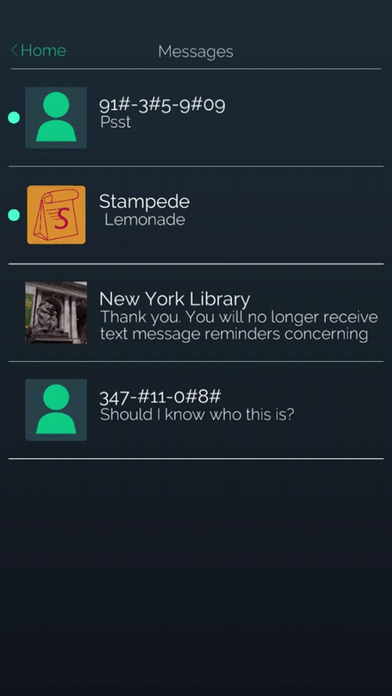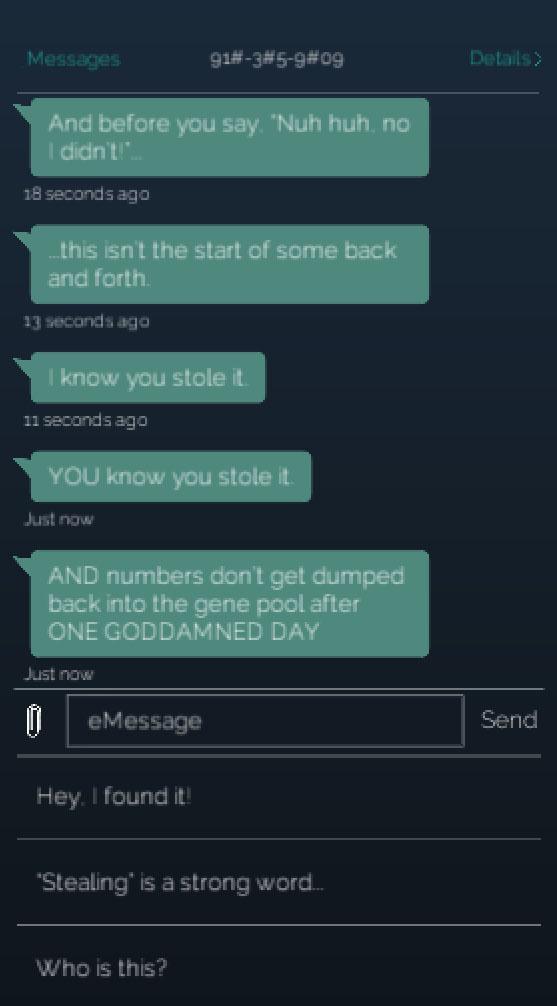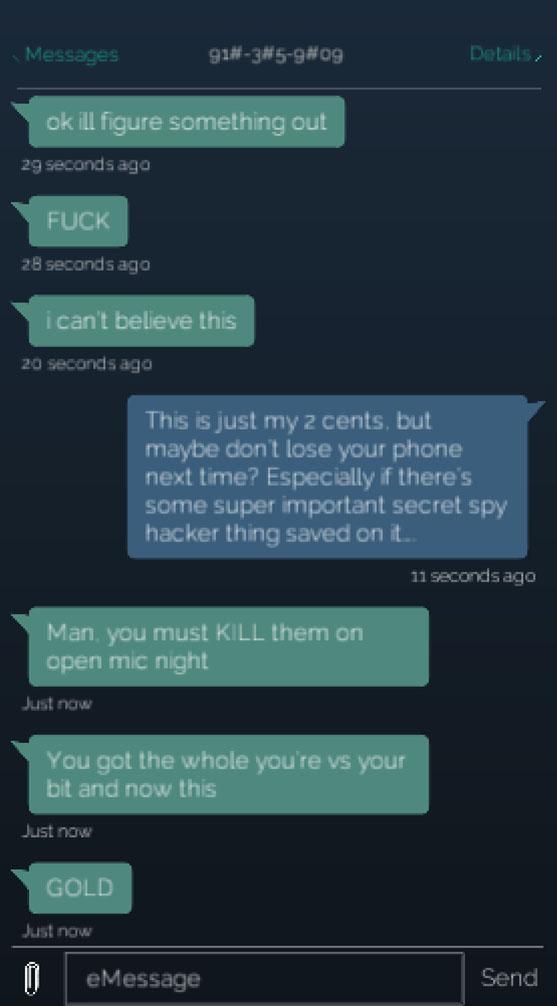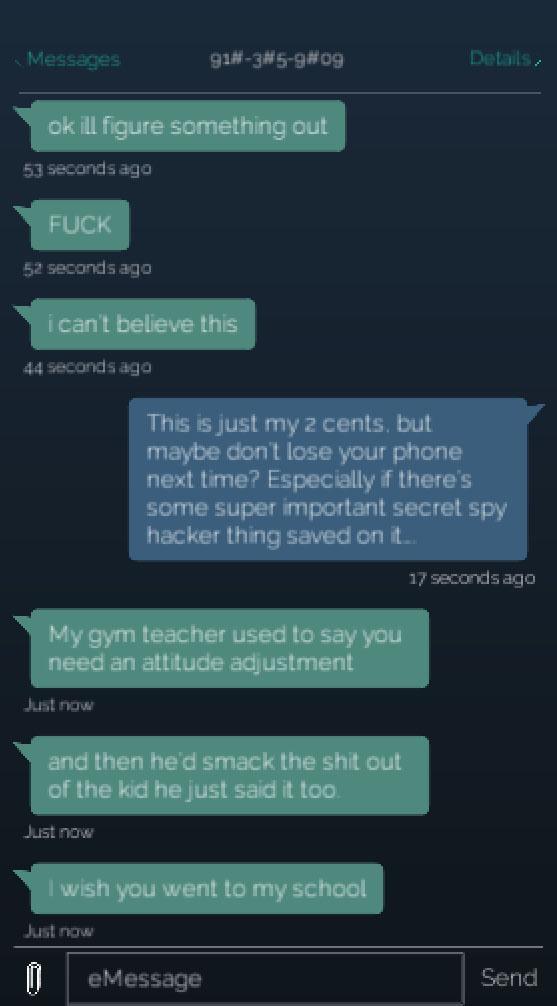Creating a realistic chat in the game Mr. Robot: 1.51exfiltrati0n

Who: Adam Hines, co-founder of Night School Studio and game director, and Kevin Riach, game designer and producer Mr. Robot Ep1.51exfiltrati0n , released in August 2016
Kevin Rayeh: although Night School Studio was founded in 2014, Adam and I started working on the first game of the studio Oxenfree in July 2015.
 Adam was the only scriptwriter and director of the project, and I got involved in the development later. I was taken as a temporary designer to have time to release the game on time. Last January, we released this adventure game based on choices for PlayStation, XBox, on Steam, GOG, and other sites that sell video games.
Adam was the only scriptwriter and director of the project, and I got involved in the development later. I was taken as a temporary designer to have time to release the game on time. Last January, we released this adventure game based on choices for PlayStation, XBox, on Steam, GOG, and other sites that sell video games.')
After the release of Oxenfree, we started brainstorming on different concepts for the next project. Initially, the studio was founded precisely as a small team to create games at the intersection of history and interactivity.
We knew that we wanted to use a more unusual approach to the story of an interactive story, so we studied the idea of the plot, entirely told through text messages.
Soon Universal turned to us with a proposal to create a game in the universe of Mr. Robot , and it seemed to us that these two ideas are perfectly combined.
The team, which consisted of six studio staff and two employees, managed to complete the game development cycle in six months. Almost immediately after the development began, Adam's former colleagues from Telltale Games (whom I helped create The Wolf Among Us ) joined us. And so was born the game Mr. Robot Ep1.51exfiltrati0n (I will call it Exfiltrati0n for short).
What: modification of the free chat system from Oxenfree to simulate real-time text chat
 Kevin Rayeh: If you compare Oxenfree with other games based on options, then first of all it differs by how naturally the dialogues flow.
Kevin Rayeh: If you compare Oxenfree with other games based on options, then first of all it differs by how naturally the dialogues flow.In the end, this was the goal of the design of the core of the game and we sought to accurately simulate the speech patterns of real-world communication. Therefore, when creating Exfiltrati0n, we knew for sure that in order to fully immerse in history, it would be necessary to clearly grasp the rhythm and style of textual communication in real life.
Adam Heins: At first it seemed pretty simple, but as it turned out, we were too naive. Let's start with the fact that anyone who is interested in the idea of this game knows what text communication is. The player perceives it so naturally that if he feels the slightest falsehood, then the whole illusion will be destroyed. The game will be similar to many other creations of authors who do not understand the importance of intonation and context.
You can, for example, recall an episode of one of the endless political series in which there was an invented “Internet site” YourSpace. It was a tasteless slide show, as if created by a man who had never sat at a computer.
On the other hand, take for example the classics of the horror genre - the movie "Scream". Before the production stage, the authors did not have time to resolve the issues with the copyright holders of the “Ghostface” mask, but even the 95% did not FULLY organize the exact copies of the director. Therefore, they used the mask in the film, which they had, hoping that they would be able to find rights owners in time. And the risk was worth it.
The point is that there is a fine line between persuasiveness and falsehood. And it is the details that shift the balance in one direction or another. If you do not have time to polish parts, then instead of creativity it is better to do something else, for example, build roads. Believe me, I myself also thought about it.

What for?
 Adam Heins: from the TV series Robot touches upon various topics, it constantly encounters situations of intersection of people and technologies: usually everyday, sometimes beautiful, sometimes traumatic.
Adam Heins: from the TV series Robot touches upon various topics, it constantly encounters situations of intersection of people and technologies: usually everyday, sometimes beautiful, sometimes traumatic.We shared with Sam Esmail (the creator of the series responsible for the scenarios of most episodes and directing the entire second season) and the USA Network guys thinking about this concept, resulting in the creation of a mobile game, which takes place entirely in the text messaging application.
During a busy week, the player interacts with the characters of the series, who made dubious moral choices: they use social engineering in the invisible attempts of the fsociety hacker team to destroy E-Corp, an evil technological conglomerate and one of the largest companies in the world.
To cope with this task, the application must serve as a kind of “skin” for an interactive script: the player receives a text message and supports the conversation by choosing the most suitable in his opinion version of two or three answers.
Therefore, as everyone believed, our task was quite straightforward: the game should look like a real application. It should be natural, while sending and receiving messages should be interesting! The first task - creating a sense of reality - meant that from the point of view of the script, some aspects would contradict a good gameplay.
Messages should not come as a constant, predictable stream, in any case! Communication should be jerky, awkward, the interlocutors sometimes have to disappear for a few minutes, and then immediately begin to communicate on several topics. The player should not know their names until they know who they are. They make mistakes while typing and sometimes they are difficult to understand. The user should be able to have several conversations at the same time, receiving information in one chat, and using it in another.

Pauses and waiting
Adam Heins: to write all this, you need to keep track of what the player knows when he finds out, and when he should talk about it. We need to control the pauses between messages to create a convincing communication pace. One of the ways to make communication in video games natural is to not let the character with whom the player speaks be silent, even when the player decides what to say. We call these moments "standby."
In real-life simulation with face-to-face characters, this works great. When a player thinks about a choice, they fill the pauses with conversations, as in a real conversation.
When text communication is not so simple: of course, the characters have to write to the player when he answers, but in our bustling world of the answer sometimes you have to wait several hours or days. And if a player is so lazy, then the characters of the game (who, as we remember, need an answer right now and no later) should remind him of this, gradually becoming more serious. Therefore, we have added another “level” of standby mode that hurts the player. It turns on when a player simply reads messages and does not respond for a long time.
Here is an example from the beginning of the game. Darlene first writes to the player that she knows about the theft of her phone.

Transfer
- Ps-s
- Listen to me
- DEBIL.
“Do you know how I found out that you stole my phone?”
- BECAUSE YOU READ MESSAGE FROM THIS PHONE.
- Listen to me
- DEBIL.
“Do you know how I found out that you stole my phone?”
- BECAUSE YOU READ MESSAGE FROM THIS PHONE.
At this point, the player can respond, and while options appear on the screen, Darlene continues to scold him.

Transfer
“And until you said,“ Nah, I didn't do that ... ”
- ... add that you do not need to start arguing.
- I know you stole it.
“You know you stole it.”
- And phone numbers are not returned to operators of all THROUGH ONE DAY
Variants of answers:
[Hey, I found him!]
[“Stole” - this is too strong a word ...]
[Who is it?]
- ... add that you do not need to start arguing.
- I know you stole it.
“You know you stole it.”
- And phone numbers are not returned to operators of all THROUGH ONE DAY
Variants of answers:
[Hey, I found him!]
[“Stole” - this is too strong a word ...]
[Who is it?]
Now she will wait patiently for the player’s response and stop sending messages for a few minutes. If the player does not respond within a certain time, she will contact again.

Transfer
- Hey!
- hiding in your stinky cafe, you will not run away from the problem
- Barista is only pretending to like you because he likes you, freak.
- RESPONSE
- hiding in your stinky cafe, you will not run away from the problem
- Barista is only pretending to like you because he likes you, freak.
- RESPONSE
Kevin Rayeh: The system itself is deceptively simple. Our scripting system allows you to run multiple conversations in parallel. Selected options are kept separate from the character dialogs. The selection made by the player adjusts the corresponding saved dialogs. I hope that such metamorphoses make the characters look like real people, not chat bots.
Callbacks
Adam Heins: we have come up with another way to make the player forget that these are just zeros and ones - the game remembers the choice made by the player earlier. Here is an example from the same conversation with Darlene:

Transfer
- Listen, "stole" - this is too rough. I did not reach into your pocket? And who said that this is generally the right number.
- The number is correct. And this is not your phone.
- I'm 100% sure of that
- So don't play with me
Variants of answers:
[I just picked it up.]
[YOURS, not YOURSELF]
[Okay! I admit, got caught!]
- The number is correct. And this is not your phone.
- I'm 100% sure of that
- So don't play with me
Variants of answers:
[I just picked it up.]
[YOURS, not YOURSELF]
[Okay! I admit, got caught!]
If Darlene responds with “YOUR, not YOUR” (“It's YOUR, not YOU'RE”), then the game will remember that. But this is not the most important: how this information emerges is important. For example, later in a conversation a player may say:
3) Next time, don't lose the phone ... (Don't lose your phone next time ...)
Then, if the player has previously made a comment about "his", Darlene will answer:

Transfer
- Dude, you just burn today.
- At first, I hooked with "my" instead of "your", now this.
- AMAZING
- At first, I hooked with "my" instead of "your", now this.
- AMAZING
But if the player did not cling to the words, then she will give a more general answer:

Transfer
- As my fizruk said at school, you need to correct your attitude.
- after that he asked the heat to the one to whom he said this.
- pity you didn't study at my school
- after that he asked the heat to the one to whom he said this.
- pity you didn't study at my school
Wonders interactive storytelling! I think all this looks too obvious and simple, but believe me, such techniques help create the illusion of communication with a real person, or at least with a very clever house plant.
Kevin Rayeh: from the design point of view, all these plot tricks are the basis for creating a rich narrative. Technically, these are simply traceable Boolean values, but over time it becomes incredibly difficult to remember the ever-complicated web of references to the past and the branches it creates. We strive to document such moments as best we can, so the writers and designers have a very heavy burden of planning and frequent testing of the game.
While working on Exfiltrati0n , we sometimes ran into complex threads of decisions that could lead to a game crash. Tracking player steps and memorizing points of reference to the past become invaluable skills in designing.
Superfluous communication
Adam Hines: So, the characters of the game remember what the player said to them, and write to him in unpredictable moments. The game gradually becomes convincing.
It was necessary to throw in another important component: erroneously sent messages and spam, everything that does not have a real “goal”, but fills the space of the game. You can call this "necessary uselessness."
Last of Us is one of the latest and best examples of games in which they spent a lot of money on creating hundreds of houses, rooms and courtyards and on filling them with carefully made objects. They, in essence, have no functions. The game has no goals associated with them, but their very presence and purposelessness makes the world ten times more real.
In real life, not everything can be “used”. On the contrary, most of the visible world of us is just the scenery in which our frighteningly short life takes place. When EVERYTHING has any purpose, the games become similar to the film “The Truman Show”: small beautiful boxes, interesting, but compact and suffocating. In a narrative, an analogue of this is a situation where everyone knows everyone and nothing happens by chance. The world becomes small, it guides the player, which never happens in real life.
Therefore, we added the likelihood that on the second day of Exfiltrati0n the player will “ping” the application for flirting.

Transfer
- Hello! For you there is a message in Tingle from KAYFABE_8!
- Hello! For you there is a message in Tingle from KAYFABE_8!
- KAYFABE_8 wrote: “Is it possible to shove my [Roskomnadzor] into your [Roskomnadzor]?”
- Hello! For you, there is a message in Tingle from NormalTongue
- NormalTongue said: “Sorry for not meeting yesterday. Someone hacked my credit cards, I had to hang on the phone for 4 hours and deal with it. ”
- Hello! For you there is a message in Tingle from KAYFABE_8!
- KAYFABE_8 wrote: “Is it possible to shove my [Roskomnadzor] into your [Roskomnadzor]?”
- Hello! For you, there is a message in Tingle from NormalTongue
- NormalTongue said: “Sorry for not meeting yesterday. Someone hacked my credit cards, I had to hang on the phone for 4 hours and deal with it. ”
The player will receive spam. The game has a whole branch of group chat, which leads nowhere. Fake applications send notifications that are not needed for a goal-focused player. I am sure that all this will resent some players, as I was sometimes outraged by some empty rooms in The Last of Us .
But such a compromise is almost always worth it, even if its advantages are difficult to notice and even harder to explain. Producers hate this, because such techniques are difficult to substantiate: the benefits are difficult to grasp, therefore, with the proximity of the deadline and the rising costs, they get rid of them in the first place. But such elements of “necessary uselessness” distinguish the “cry” from “I know what you did last summer.”
Speech patterns
Adam Heins: Another, last aspect is that with so many characters (according to my calculations, the player can write more than 25 different sources), the user should already be able to understand who writes to him in style and rhythm. Two different people can not be like each other. It seems pretty simple, right?
The problem is that there is usually a trap for scriptwriters: the desire to create too different characters leads to artificial diversity and caricature. “This character always says“ Great news! ”When something good happens.” The brief moments of the manifestations of the features or strangeness of a person create an individuality better than artificially inserted words or constant eccentric behavior.
I will not give examples from Exfiltrati0n as a “good character description”, it would be too immodest. In addition, you may have your own opinion about this. For example (continuing the theme of horror), I will take a scene from the first novel about Hannibal Lecter “The Red Dragon” by Thomas Harris.
Lecter calls the college's psychiatric department, he needs to get someone else's address. When the secretary picks up the phone, he asks her to look for information in the papers of the boss, saying: "[Address] must be there somewhere nearby, in the file cabinet. I will dance at your wedding if you help me out." Having read to this point, we know that Lecter always controls his speech and would never say such absurdities sincerely. He specifically added it, “spoiled” his speech with a tactless phrase, so that it seemed to be mundane.
He ends with the phrase “I will dance at your wedding if you help me out.” I always liked this episode also because only Hannibal could say that. This familiar phrase is remembered and sounds ominous when you consider who Lecter is.
Result
It seems to me that the end result turned out to be the way we intended it. By and large, the game was a success. I think if we did it all over again, it would be possible to shorten the longest pauses between messages. So they would become less “realistic”, but perhaps more interesting.
Source: https://habr.com/ru/post/320800/
All Articles